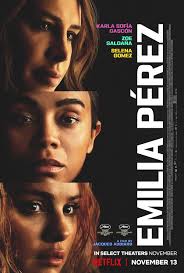
EMILIA PEREZ
France, 2024, 132 minutes, Colour.
Karla Sofia Gascon, Zoe Saldana, Selena Gomez, Adriana Paz, Edgar Ramirez, Mark Ivanir.
Directed by Jacques Audiard.
Even if you have heard about Emilia Perez and heard about its drama and its music, its impact is still surprising, very surprising.
This is the work of French director, Jacques Audiard, who has directed some strong and tough films like A Prophet, Rust and Bone, even a Western, The Sisters Brothers, but they don’t quite prepare us for Emilia Perez.
Even without the music, the singing and the dancing, there is a strong narrative. On the one hand, at the centre, is a young lawyer, Rita (Zoe Saldana, Golden Globe, Best Supporting Actress), getting murderers off charges, rather disgusted at and her profession. But, she is abducted, is confronted by a cartel chief who has a special commission for her, his disappearance, getting his wife and children to safety in Switzerland.
Even when we know the plot, the reality of the special commission is still something of a surprise. The issue is trans-gender, the cartel leader and his forming into Emilia Perez. Both roles are played by Karla Sofia Gascon, herself transgender, an imposing performance.
As mentioned, there is a wide range of songs, inserted to dramatise particular characters, different styles of music, dramatic lyrics, sometimes song and dance routines. Rita sings about her life and her attitudes towards her life, the cartel chief sings, Emilia sings, as does the chief’s wife, Jessi (Selena Gomez) and, one of the doctors Rita consults in Tel Aviv about the surgery,
Face out. Four years later. Rita is working as a lawyer in London, invited to a dinner, sitting next to an imposing rather glamorous woman – who looks deep into her, and Rita recognises Emilia Perez.
Which means that the second part of the film, while in Mexico, is a story about Emilia trying to bond with her children, posing as an aunt, suspicious of the behaviour of Jessi who links up with a past lover, but, more importantly, the opportunity for a cartel chief to do some kind of good, some reparation, disturbed by the relatives of those who have disappeared, starting a foundation to dig up graves, identify bones, restore some kind of peace to bereaved families. And a complication in a relationship with one of the wives who actually does not grieve the death of her brutal husband.
It has to come to a head, of course, and it does so in a rather Mexican cartel violence fashion.
Punning on the director’s name, some have called the film ‘audacious’. In many ways it is. In many ways unpredictable. And, so often when we are wondering where it is all going, the characters burst into self-identifying songs.
- The impact of the film? The drama? The music and songs? The interconnection? Real, surreal? The wards and nominations?
- The work of the director, the French origins of his story, the Mexican settings, French language, Spanish, English? The range of the cast?
- The impact of the songs, dramatising each of the characters singing, the lyrics, the musical rhythms and style, the musical numbers, choreography, within the context of the narrative, the hospital, clubs…?
- The initial focus on Rita, as a lawyer, her background, Spanish-speaking, defending the murderer, alleging his wife suicide, the performance in the court, the verdict, his reaction, her reaction, her song?
- The phone call, the rendezvous, her being abducted, in the presence of Manitas, threatening, his song, the surprise of the request? Her intervention? Transgender issues? In the context of his leaving the cartel and his brutality? His wife, the children?
- Rita, the consultation in Bangkok, the interview with the doctor in Tel Aviv, his song? Rights and wrongs of the procedure, its taking place, post surgery, masked, success of the operation? Rita and the money, her life, in London?
- The character of Jessi, the children, Rita organising them to live in Switzerland?
- The meal, sitting next to the woman, looking at her, recognising Manitas, Emilia? Look, manner, filling, clothes, talk, with Simon? A new commission for Rita, to recover her children?
- The return to Mexico, getting Jessi and the children from Switzerland, Emilia posing as their aunt, her mothering them, demonstrative, Rita urging caution? The reaction of the children, Mexico City, going to school, life at home?
- Jessi, personality, young bride, the later revelation is by Emilia about money tales and Jessi’s sister, marrying her, the children? Happiness and unhappiness? Enjoying the life in Switzerland? Making contact again with Gustavo? The relationship, the outings? The sensuality of her song?
- Emilia and her change of attitude, yet her capacity for ruthlessness, the approach by relatives of her victims, the setting of the foundation, Rita doing the business, the interviews, the money available, the digging up of the groups, identifying the bones?
- The visit of Epifania? Her dead husband, the knife, the interview with Emilia, the truth about her husband, glad that he was dead, the bond with Emilia, the later meetings, the affair, the emotional impact on Emilia, as former male, as female, as trans?
- Jessi, wanting to go with the children, with Gustavo, the disappearance? Emilia, her pursuit, ruthlessness? The confrontations with Jessi, tying up Emilia, getting loose, the fight, her revealing the truth, Jessi’s dismay?
- Chase, the dangers, Rita coming with the money, Emilia as hostage, the guns, the shooting, the car, the explosion?
- The ending with Epifania, cult of Emilia, procession and hymns, statue, the women, mourning Emilia, with Rita, her experience, the spirit of Emilia, her continuing the work and caring for the children?